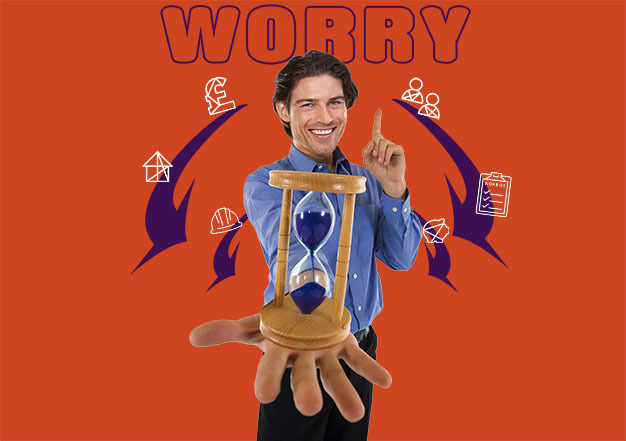Worry Time - and how it helps

The concept of setting worry time does sound a bit mad when you first consider it, and when I introduce the idea to my counselling clients I do often say, look, this is going to sound counter-productive, but bear with me...
A lot of people, if they're a natural worrier, feel that the very act of worrying serves a kind of purpose for them. Perhaps they might feel like it prepares them for some kind of worst case scenario, because they think the worst will inevitably happen, so worrying about outcomes is their way of running through what they might do.
Worrying is quite natural. Where it might start to become a problem is when it crowds out all your waking thoughts, distracts you from your job or stops you enjoying the things you usually enjoy. A worry might pop into your head and you start thinking about how you might solve it, what if this happens or that. Then comes another worry, and before you know it the anxiety builds.
The idea of worry time is that it gives you space to worry, but teaches you to confine it to an allotted time so it doesn't take over your life.
Here's how:
- I say to my clients, imagine you're sitting at your desk and a worry pops into your head. Picture it in a kind of speech bubble above you if it helps to visualise it. You say to it, 'Yes, I can see that you're there. I am going to worry about you, but just not now.'
- Jot it down, physically write it on a list. Put it to one side and let it go.
- Set aside a time, after work, maybe after dinner, but not too late so it's not too close to bedtime.
- Set a timer for 30 minutes and start worrying! Go through your list, and worry as hard as you can... problem solve if it helps. When the alarm goes off, you stop, and start your new list for the next day.
Sometimes when some clients actually get to their list at worry time they might find a worry has lost its strength. It won't happen overnight, but my clients tell me that increasingly they notice there are periods of the day where they are able to focus on work or relax and enjoy doing something without invasive worries popping into their heads.
Eventually, someone might continue to practise a kind of worry time as it becomes part of their routine, but maybe not with a formal list anymore. The important thing is you are still allowing yourself to worry - because it is not necessarily healthy to push the thoughts away and not give them head space - but the client takes control of the worrying rather than the worrying taking control of them. This can feel exciting and empowering, because it's in their control!
This is a technique used often in CBT (cognitive behavioural therapy) and has helped to play a huge part in helping a number of my clients.
Bernadette Antoniou BABCP MBACP is a counsellor and cognitive behaviour therapist for LionHeart.
- Find out more about worry time in this short BBC video from All in the Mind www.bbc.co.uk/programmes/p03rwr72
- Download a guide to Worry Time here
- Our counsellors recommend the ReachOut Worry Time app, available for Apple and Android
- Find out more about the LionHeart counselling service
- Article: 7 ways to stay positive (even if you don't feel like it)


